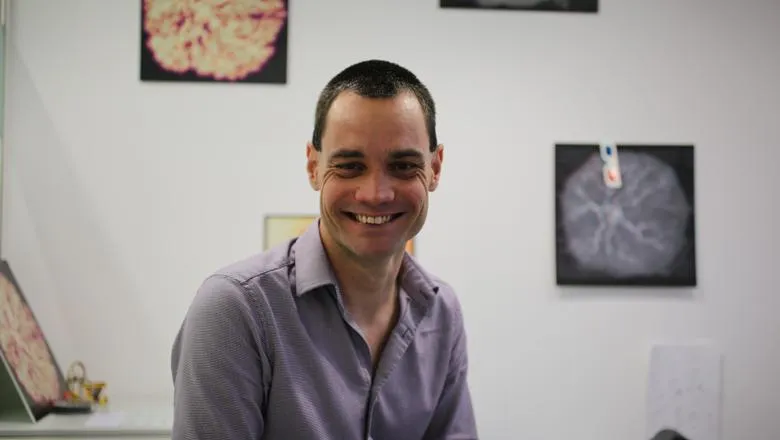14 January 2020
What did your placenta ever do for you?
Dr Andrew Melbourne explains why the placenta is one of the most important organs in the body

Despite its critical role in life, the placenta is a fantastically complex organ that is relatively misunderstood.
The placenta is therefore essentially the lifeline of the fetus, and arguably one of the most important organs in the human body. During pregnancy the developing fetus depends entirely on the placenta to provide all the oxygen and nutrition required to grow and develop.
Dr Andrew Melbourne, senior lecturer in Healthcare Technologies, researches the placenta and says that although we all had one, our understanding of its role in pregnancy is limited because it is very difficult to access whilst in the womb. Even with ultrasound scanning, it can be quite difficult to observe what is happening.
One area that Dr Melbourne and his team are looking into is fetal growth restriction. This is when the baby is not reaching their full growth potential.
Funded by the Wellcome Trust, Dr Melbourne is working very closely with clinicians at University College Hospital and UZ Leuven in Belgium, to improve our understanding of how the placenta works.
The cross-disciplinary, cross-institutional collaboration of this project generated some novel ideas about how to measure placenta function in specific conditions like fetal growth restriction and in twin pregnancies where fetuses share a placenta.
One of the interesting things that Dr Melbourne’s research team is trying to measure is the oxygen level of the fetus.
“Currently, there’s no way to measure the fetal oxygenation without using invasive measurements to take blood samples,” Dr Melbourne said. “And those are not without risk. Techniques using MRI can help us to measure placental function more safely.”
His research team came up with a new magnetic resonance imaging (MRI) mechanism that was sensitive to how much oxygen was getting to the baby, they designed a new acquisition and computational model and applied it to the placenta. As therapies for fetal growth restriction become available, this type of advanced imaging may help us more quickly assess the effect of these new treatments on placental function.
Research in South Australia
Validation of these measurements is extremely challenging but Dr Melbourne came across some similar research being done in Adelaide, South Australia by Head of the Early Origins of Adult Health Research Group, Professor Janna Morrison at The University of South Australia. Professor Morrison’s group is investigating the mechanisms behind fetal growth restriction in sheep pregnancy and acquire physiological data suitable for validating Dr Melbourne’s non-invasive MRI measurements.
“Working closely with Professor Morrison and her group, we carried out experiments throughout July and August in 2019 and now we are busy looking through the data to see how our MRI measurements relate to the simultaneously acquired ground truth blood oxygenation data,” Dr Melbourne said.
Early results from this collaboration work are now under peer-review and we look forward to publishing further results in 2020.
What did your placenta ever do for you?
Learning more about the placenta and answering some of the questions that researchers are posing is the focus of the upcoming event, What did your placenta ever do for you? at the Royal Institution, on 30th of January 2020.
Dr Melbourne and obstetrician Dr Rosalind Aughwane will talk about new concepts and therapies that are currently being introduced in the UK alongside state-of the art technology to explore the placenta in detail.
“I think that most of us know what the placenta is, but perhaps we don’t realise just quite how important its role is in pregnancy,” Dr Melbourne said.
“The placenta is one of the most important organs in the human body because without it none of us would be here.”
This event will be a showcase for some of the state-of-the-art-research which is going on in developing new tools to measure what’s happening to the baby, how to improve ability to do surgery on that fetus and placenta and what can be achieved when institutions work together.
To find out more visit the event page: What did your placenta ever do for you?
Dr. Melbourne also leads the new King's College London MSc programme in Healthcare Technologies based at St Thomas's Hospital.
